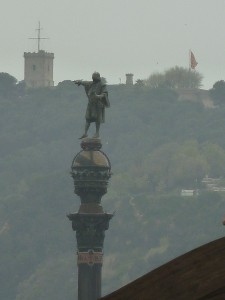W Christian Consulting
What could you be doing better?
Appreciating American Prehistory
Today being Columbus Day and me living in England, I’m taking a few minutes to reflect on the richness of American Prehistory. When it comes to Columbus Day, I’m one of those cynical people who rather laugh at the idea that we set aside a day to celebrate a huge navigational blunder that ended up working out well for the crew and their benefactors. I appreciate the day off from work and I do recognize that sailing some 4500 miles in a 15th Century ship was a significant feat of courage and determination. However, to say that Columbus “discovered” America is a misnomer because, aside from the fact that he wasn’t looking for it, it wasn’t lost.
Archaeologists and Anthropologists haven’t figured out for how long they were there, but it is clear that people had been living in the Americas for hundreds and most likely thousands of years prior to the arrival of Europeans across the Atlantic. Well before the famed discovery of the West Indies and the New World, great cities like Chichen Itza in Mexico’s Yucatan Peninsula, Cahokia near modern-day St. Louis, and the cities of the Pueblo peoples (or Anasazis) had been thriving. Of course, according to legends, some of the peaceful early inhabitants of the Americas greeted these new comers, helped them to survive, and led them on expeditions across the frontiers.
To say that America has a short history because it is only 239 years old is like saying that English history only began in the mid-700s or that South Sudan only has 4 years of history. That is, it dismisses and devalues all the people who came before the current reigning power or people group.
Living and Traveling through Europe, we see building after building that has been standing hundreds or thousands of years. When I see massive structures like Stonehenge and Hadrian’s Wall in England, the Parthenon in Greece, and the ruins of Carthage in northeast Tunisia, I am so impressed by the scale and sophistication of the builders and the fact that the structures, some admittedly in ruins, have survived these thousands of years. My friends in England are all too quick to point out that various buildings in everyday use have been around since before the founding of my own country. I agree; it is very impressive.
When I compare the history of the United States to that of other countries around the world, I am tempted to feel a little sad that my relatively young country doesn’t have a similar history. However, I am encouraged when I remember that what people did does not become more important because they wrote it down or because there is a structure to testify to it.
Since those first tribes crossed the Bering Strait following herds, in search of new ground, or maybe in search of adventure, America has been a land of opportunity. There have been violent clashes and peaceful coalitions. There are parts of which I am proud and parts which I wish weren’t there. Nevertheless, many people lived and died over thousands of years making America what it is today. And, although there are few monuments from the ancients, America’s history and prehistory is rich, varied, and long.


 RSS - Posts
RSS - Posts